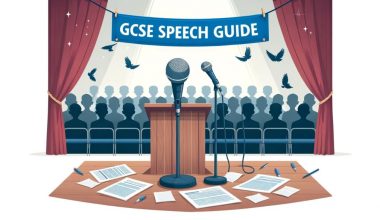GCSE exams are taken by students around age 16, finishing Year 11 in secondary school. These tests are essential because they check how well schools are doing and if students can move to the next level of education. But since English Language is one of the mandatory GCSE subjects, you may want to know: is English GCSE hard to pass?
Usually, students do about 9 GCSEs, but this can change. Subjects include languages, arts, science, sports, etc.
However, everyone has to pass three subjects: GCSE Math, GCSE English, and GCSE Science. Apart from these, you can pick what you like.
In this article, you’ll learn more about GCSEs and whether or not GCSE English Language is hard to pass.
Table of contents
What Are GCSE Exams, And Why Are They Important?
GCSE exams, which stand for General Certificate of Secondary Education, are a type of academic assessment taken by students in the United Kingdom, usually around the age of 16. These exams are essential in a student’s educational journey and significantly shape their future.
Furthermore, GCSE exams cover math, science, English, history, and more. So, students study these subjects during their secondary school years, typically ages 11 to 16. The exams are usually taken in various subjects, each testing what a student has learned.
So, let’s look at why they are considered essential:
- Educational Progress: GCSE exams help teachers and schools understand how well students perform in their subjects. Also, they show what students have learned and where they might need extra help. This information helps tailor teaching methods to meet each student’s needs.
- Further Education: Doing well in GCSE exams can open doors to further education. Many colleges and vocational schools look at GCSE results to decide whether to admit students. Thus, good results can give students more options for future studies and careers.
- Job Opportunities: Some jobs require specific GCSE grades as a minimum qualification. Therefore, good GCSE results can increase the chances of getting hired for particular jobs. It shows potential employers that you have a solid foundation of knowledge and skills.
- Personal Confidence: Doing well in GCSE exams can boost your confidence. And seeing your hard work pay off with good grades gives you a sense of achievement and self-assurance.
- A Path to A-Levels: Some students choose to study A-levels after GCSEs. These are more advanced courses that can prepare students for university. So, excellent GCSE results can help you get into your desired A-level program.
- Life Skills: While preparing for GCSE exams, students develop essential life skills like time management, organization, and problem-solving. And these skills are valuable in many areas of life.
GCSE exams are not just about memorizing facts; they test your understanding and ability to think critically and apply what you’ve learned to real-world situations. Studying regularly, seeking help when needed, and staying positive can contribute to success in these exams.
How Hard is GCSE English Language?
GCSE English Language, a crucial part of the General Certificate of Secondary Education in the UK, is moderately challenging (a bit hard). Therefore, you should approach it with a positive attitude and proper preparation to excel.
GCSE English primarily evaluates your reading and writing skills, encompassing the ability to convey your thoughts clearly and comprehend others’ ideas. Depending on your strengths and interests, some might find it more manageable than others.
- Reading Comprehension: involves reading various texts and answering questions to demonstrate comprehension. At times, the texts might be intricate, necessitating multiple readings.
- Literary Analysis: This aspect entails dissecting poems, stories, or plays. It requires uncovering deeper meanings and discussing the employment of literary techniques.
- Writing Proficiency: You’ll be tasked with crafting essays, narratives, or arguments. However, organizing your thoughts coherently and adhering to proper grammar can pose difficulties, which can be surmounted with consistent practice.
Below are the measures to adopt when dealing with a GCSE English Language exam. If you follow them, you will not find it hard to pass your GCSE English Language exam.
- Regular Reading: Enhance your understanding and vocabulary by engaging with diverse texts. And reading books, news articles, or even subtitles on TV shows can contribute significantly.
- Writing Exercises: Regular writing practice refines your skills. Hence, initiating a journal, composing short stories, or attempting a blog can provide valuable practice.
- Pre-Essay Planning: Before you begin writing, sketch a simple outline and write down the main ideas you intend to incorporate. This practice facilitates smoother essay construction.
- Employ Examples: When analyzing literary works, supporting your points with specific examples from the text lends depth to your analysis.
- Seek Assistance: If you encounter challenges, don’t hesitate to solicit help from your teacher or classmates. Collaborative discussions can offer fresh perspectives.
Read this article: Top 10 Hardest GCSE Subjects | 2024 Ranking
How To Prepare For GCSE English Exams
Following these steps can make preparing for your GCSE English exam simpler. First, familiarize yourself with the exam format. Understand that it generally consists of four components: reading, Writing, Speaking, and Listening. Each part has specific tasks and time limits, so knowing what to expect is crucial.
1. Focus on reading
Focus on reading various texts such as novels, poems, and articles. As you read, take notes to remember key points and ideas.
Practice summarizing what you’ve read, enhancing your comprehension skills and helping you retain the material better.
2. Practice several essay types.
For the Writing component, practice different types of essays like narrative, descriptive, and argumentative. Before you start writing, it’s essential to plan your essays. Jot down the main points and examples you want to include.
To ensure your essay is organized logically, use paragraphs. Lastly, always check your grammar and spelling to present your ideas clearly and effectively.
3. Work on your speaking skills.
Practice speaking clearly and confidently. Prepare for spoken tasks such as describing a picture or discussing a topic. Listening to native speakers can improve your pronunciation and intonation, helping you communicate more effectively.
4. Have good listening skills.
For the exam’s Listening aspect, engage with audio materials like podcasts, interviews, and speeches. While listening, take notes to capture important details. Then, practice answering questions based on what you’ve heard to improve your listening comprehension.
5. Learn new words
Expanding your vocabulary is crucial for success in the English exam. So, please make an effort to learn new words daily and incorporate them into sentences.
Maintain a vocabulary journal to record unfamiliar words and their meanings. Again, flashcards are a great tool for memorizing definitions effectively.
See also: What Are GCSE Mock Exams? Your Ultimate Guide for GCSE and A-Level
6. Have solid grammar skills.
Solid grammar skills are a must. Review basic grammar rules and common mistakes—practice using correct grammar in your writing and speaking. Feel free to seek clarification on grammar points that you find challenging.
7. Create a study schedule.
Effective time management is essential. So, create a study schedule that allocates time for each aspect of the exam. Break your study sessions into manageable chunks to prevent burnout and maintain focus.
8. Manage stress
As the exam approaches, manage stress by practicing relaxation techniques such as deep breathing. Prioritize sleep to ensure you’re well-rested on the exam day.
9. Make revisions
Utilize revision techniques like creating visual aids such as mind maps to organize information. Teaching the material to someone else can also reinforce your understanding and memory retention.
10. Maintain a healthy lifestyle.
Eat nutritious meals and stay hydrated. Engage in physical activities to reduce stress and stay focused. Remember, consistent effort, a positive mindset, and seeking help when needed are all essential to passing your GCSE English exam. Believe in yourself – you can do well!
Check out: How to Revise for GSCE History: 2024 Ultimate Guide
GCSE English Tutoring: Why is it The Best Way To Study For Exams?
GCSE English tutoring is the ideal approach for exam preparation. Personalized guidance ensures focused learning.
Meanwhile, tutors offer tailored strategies, addressing weak points and enhancing strengths. Direct interaction aids comprehension and effectively clears doubts.
Tutoring provides structured study plans, time management skills, and practice resources, optimizing readiness. Feedback on practice tests aids improvement.
Again, confidence grows through continuous support and encouragement. Instructors adapt to individual learning styles, making complex concepts more straightforward. Tutoring minimizes stress, boosts motivation, and maximizes exam success chances.
Read also: Guide to GCSE Exam Boards: Popularity, Pass Rates, and More
The Benefits of GCSE English Tutoring
- Tutors provide one-on-one attention, tailoring lessons to your learning pace and style, ensuring a deeper understanding of challenging topics.
- They also identify your weak areas and concentrate on improving them, optimizing your study time and efforts.
- Your tutor shares effective study techniques, time management skills, and exam strategies that enhance your performance and confidence.
- Offering constructive feedback on assignments and practice tests, pinpointing areas for improvement, and guiding your progress.
- Through continuous support and encouragement, tutoring helps build confidence in tackling exam questions, reduce anxiety, and increase success chances.
Read this article: Last-Minute GCSE Revision Tips| Score Higher In Last Minute
Is English GCSE Hard? Achieve Your Goals With a GCSE English Tutor
While its difficulty can be subjective, a GCSE English tutor can be your trusty guide, equipping you with the skills and confidence to conquer the exam. Let’s see the factors that might influence the perceived difficulty of English GCSE:
- Textual Wrangling: Do literary terms like “metaphor” or “imagery” make your head spin? Understanding and analyzing different text types – poems or persuasive writing – can be difficult for some students.
- Expressing Yourself: Clearly and confidently conveying your ideas through writing is a core skill tested in the English GCSE. Struggling with sentence structure, vocabulary, or expressing complex arguments can make this aspect challenging.
- Grammar: Those pesky commas and dangling modifiers! A shaky grasp of grammar and spelling rules can significantly hinder your performance in the exam.
- Critical Thinking Crossroads: The English GCSE goes beyond memorization. Developing critical thinking and analytical skills to deconstruct texts and form well-supported arguments can challenge some learners.
However, the good news is that the English GCSE is achievable with the right approach. If you enjoy reading and exploring different writing styles, have a decent grasp of the language, and are willing to put in the effort, you’re well on your way to success.
Also, a GCSE English tutor can be your secret weapon in passing the exam. Here’s how they become your guide to success:
- Understanding Your Peaks: Unlike a one-size-fits-all approach, a tutor assesses your strengths and weaknesses, tailoring lessons to address your specific needs. They identify areas that require extra focus and personalize learning materials to make the journey engaging and effective.
- Explaining Tough Concepts: Your tutor breaks down tough concepts, providing clear explanations that break down complex topics into manageable chunks. Suddenly, those literary terms and analytical frameworks become clear and applicable.
- Practice: Your tutor provides regular opportunities to hone your writing, analysis, and critical thinking skills through targeted exercises and mock exams. They’ll also offer constructive feedback, helping you refine your work and identify areas for improvement.
- Building Confidence: Exam nerves can be a real challenge. Your tutor boosts your confidence and encourages the learning process. With their support, you’ll approach the exam feeling prepared and ready to showcase your skills.
So, is English GCSE hard? It depends on your background and approach. But with a dedicated GCSE English tutor, you can turn this perceived challenge into an achievable goal.
How To Find a Good GCSE English Tutor
- Look for tutors with a solid educational background in English or related fields. A degree in English, education, or a relevant subject can indicate their expertise. Experience in teaching or tutoring English, especially at the GCSE level, is also valuable.
- Seek recommendations from friends, family, teachers, or online platforms that specialize in connecting students with tutors. Moreover, reading reviews and testimonials from previous students can provide insights into the tutor’s teaching style, effectiveness, and rapport with students.
- Arrange initial meetings or interviews with potential tutors. This will allow you to gauge their teaching approach, communication skills, and ability to tailor their methods to your learning style. Moreover, a good tutor should be adaptable and patient.
- Effective communication is vital for a tutor to explain concepts clearly and address your questions. During the interview, please pay attention to how the tutor articulates ideas and how well you understand their explanations.
- Discuss the tutor’s teaching strategies and how they plan to address your specific needs. A proficient tutor will have a structured plan to cover the GCSE English curriculum while accommodating your weaknesses and strengths.
- Ensure the tutor’s availability aligns with your schedule. Additionally, inquire about their flexibility in adapting to changes in your academic demands, exams, and coursework deadlines.
See also: How Many Marks Is It To Pass GCSE Maths In 2024?
FAQs On Is English GCSE Hard To Pass?
Both GCSE English options are valuable. English focuses on communication skills, while English literature explores texts like novels and poems. Both are highly regarded and often required by universities.
Among the options, the Edexcel iGCSE is often considered the easiest for English Language and Literature. The exam might have time constraints, but the grade expectations are reasonable.
In GCSE English exams, students are tested on grammar, structure, vocabulary, spelling, and punctuation. But it’s not just about passing the test but the student’s overall growth.
Yes, having a GCSE tutor can be helpful. They can guide your child in developing the skills needed to do well in the exams. A good tutor not only helps your child get good grades in GCSE math but also helps them understand the subject better, which is helpful beyond the exams.
Conclusion
GCSE exams are a significant milestone in students’ education, shaping their future opportunities. While GCSE English might be moderately hard to pass, it offers a chance to develop crucial reading, writing, and analysis skills.
To excel, focus on regular reading, practice various essay types, work on speaking and listening skills, expand your vocabulary, and ensure solid grammar proficiency. Seeking help from a GCSE English tutor can provide personalized guidance, tailored strategies, and the confidence needed for success.
References
- Blog.edumentors.co.uk – Achieve Your Goals with a GCSE English Tutor
- Thetutorteam.com – HOW TO GET A HIGHER GRADE IN ENGLISH GCSE
- Quora.com – How hard are GCSEs?






